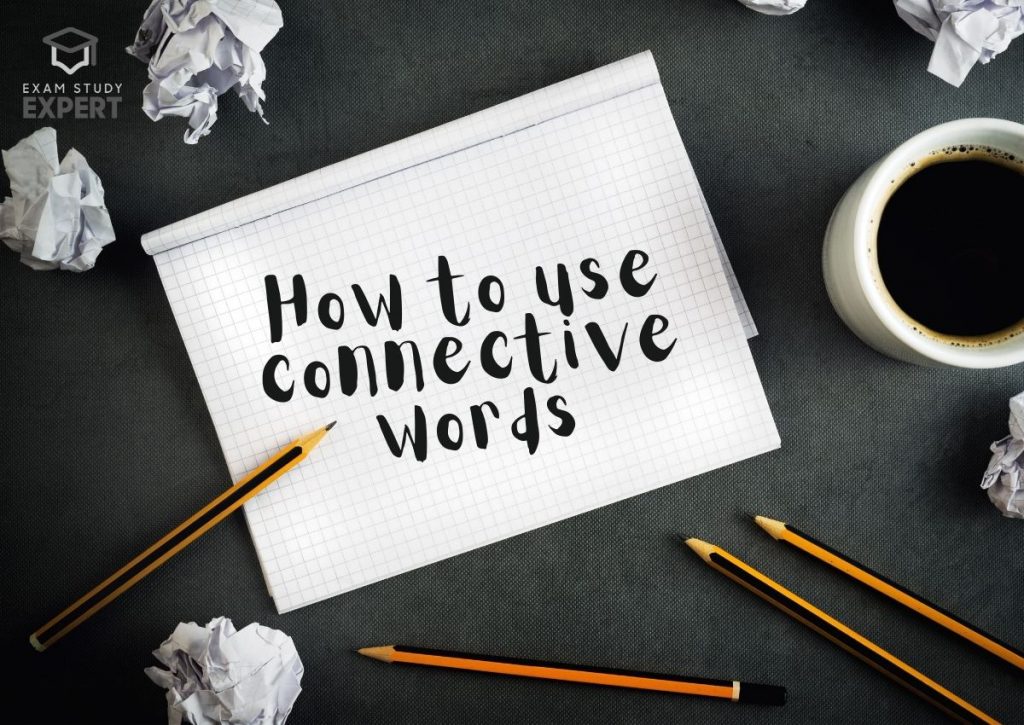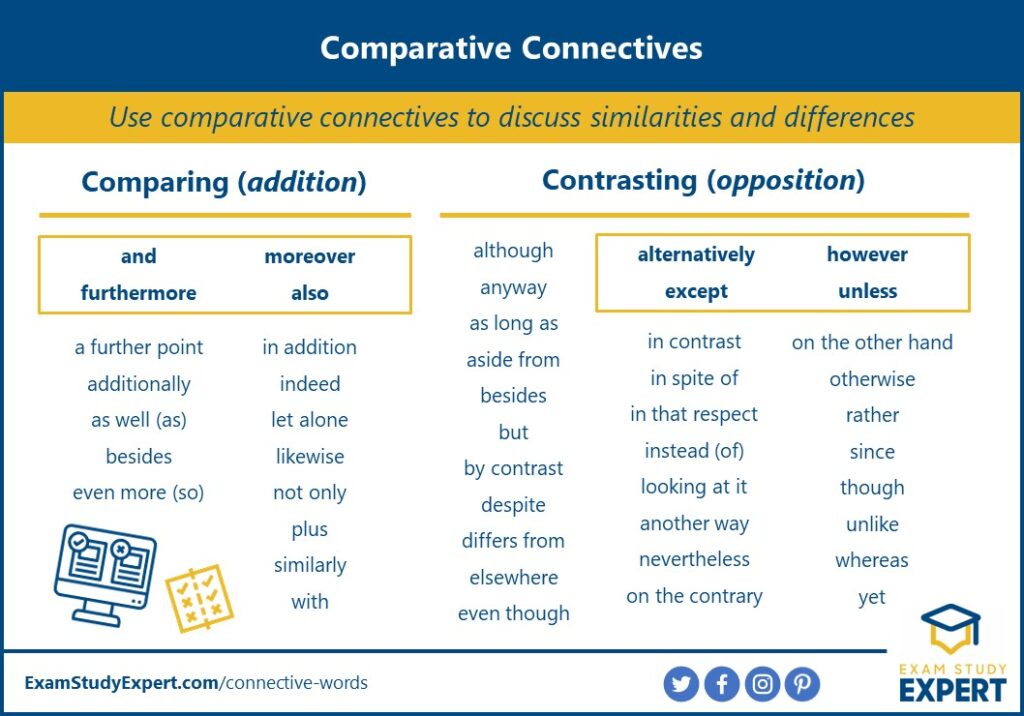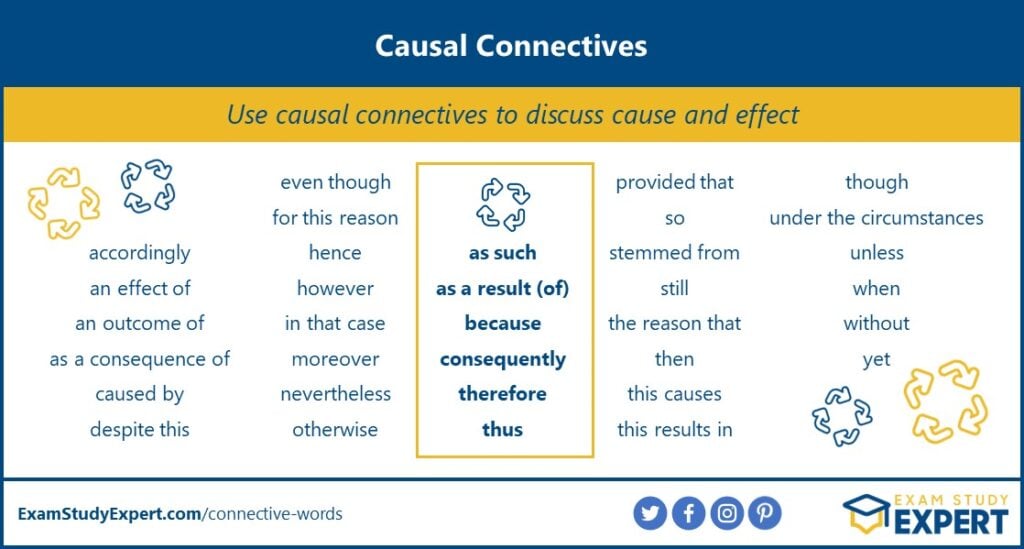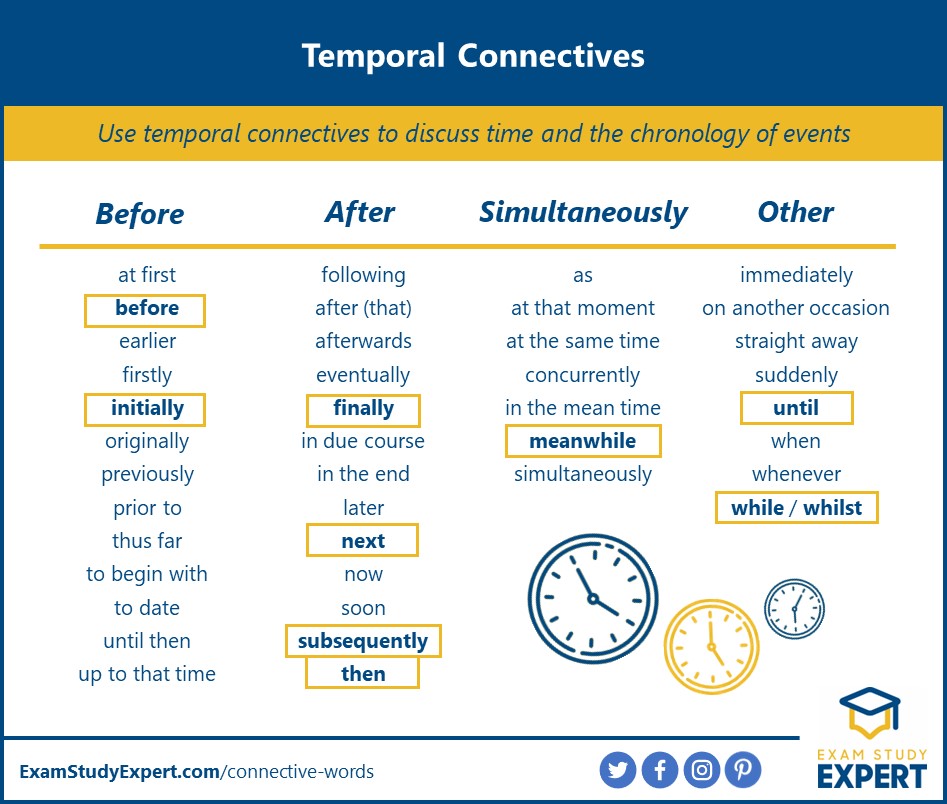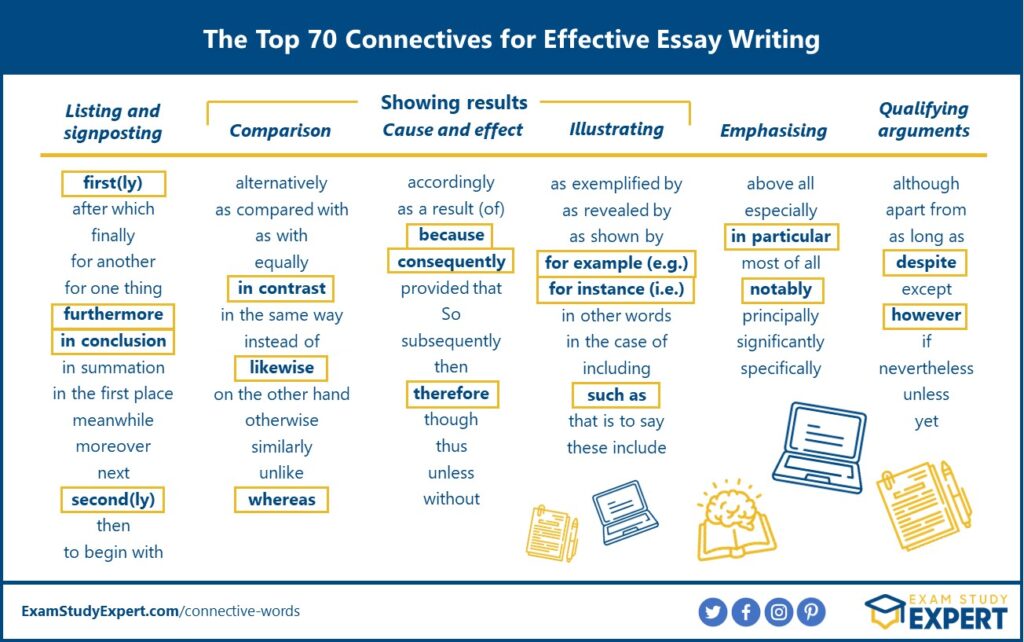What for do we use linking or connective words?
Linking or connective words and phrases are used to show relationships between ideas. They can be used to join two or more sentences or clauses.
Linking words help to connect ideas and sentences when you speak or write English. We can use linking words to give examples, add information, summarise, sequence information, give a reason or result, or to contrast ideas.
Using linking or connective words and phrases
- can improve the quality of your speech
- your ideas flow more smoothly
- the logical relationships between the ideas are expressed clearer
- act like bridges between parts of your writing and speaking
- you decorate your written work or speech by making them sound or read better.
Here’s a list of the most common linking words and phrases:
To state personal opinion
In my opinion
In my opinion, Sunday is the best day of the week.
In my view
In my view, golf is just a game and not a sport.
Personally
Personally, I am against zoos.
I believe that
I believe that new sports facilities are necessary for our school.
It seems to me that
It seems to me that this magazine will be very popular among teenagers.
I think that
I think that the problem of polluted environment is one of the most urgent.
As for me
As for me, I am greatly interested in art.
As far as I am concerned
As far as I am concerned, art plays an essential part in my life.
There are a number of reasons why I believe
There are a number of reasons why I believe that television is one of the main sources of information.
To my mind
To my mind, there are many good sportsmen in our school.
To my way of thinking
To my way of thinking, tests are not a good way of measuring someone’s knowledge.
Personally I believe that …
Personally I believe that learning about survival skills sounds incredibly interesting.
It strikes me that
It strikes me that so few of them were willing to help.
I feel very strongly that
I feel very strongly that we have to do community work, such as helping the elderly.
I’m inclined to believe that
I’m inclined to believe that students have to wear a school uniform.
Based on what I know
Based on what I know, school helps to become a better person.
I am convinced
I am convinced you should avoid fizzy drinks.
Speaking for myself
Speaking for myself, I watch TV no more than two hours a day.
I am confident that
I am confident that children should use computers sensibly.
To list points
First(ly), first of all, to start with, to begin with
Firstly it is wrong and secondly it is extremely difficult to implement. First of all, let me ask you something. She wasn’t very keen on the idea to start with. To begin with, his is a genuine talent.
For a start
You’re bored and don’t knowwhat to do? Well, you could go play outside, for a start! I’m sick of living in this city —for a start, the traffic makes commuting to work an absolute nightmare!
In the first place
Why didn’t you tell me in the first place that you’ve decided to leave?
initially (at first)
Iitially, he thought the new concept was nonsense. Initially, Steve cleared tables and washed up
first and foremost
He is first and foremost a teacher. First and foremost, I want to thank all of you for being here tonight.
Second(ly)
I want two things from my boss – firstly, a pay rise, and secondly, a longer contract.
Third(ly)
There are three factors to take into account: firstly cost, secondly time, and thirdly staff.i
in the second place
I don’t want to go yet – in the first place I’m not ready, and in the second place it’s raining.
subsequently (after a particular thing has happened; afterward)
The officer decided to stop and subsequently made an arrest.
simultaneously (at the same time)
The telethon was broadcast simultaneously on 31 US networks.
and then
Data were systematically analysed separately and then compared with one another.
next
Next, entire cities banned smoking in all indoor public places.
formerly (previously, earlier, before)
Formerly, a hectare of this precious vineyard was worth 30,000 francs.
previously
Previously, there had been 25 houses sold at or above the independent appraised value.
finally
Finally, I’d like to thank everyone for coming this evening.
on the whole (all in all, altogether)
On the whole, it was quite a good speech.
ultimately (finally; in the end)
Ultimately, it’s a question of who is more popular.
lastly
Lastly, I’d like to ask you about your plans. Lastly, add the lemon juice.
last of all
Last of all, I again want to say a lot of thanks to you for this rare occasion and for the possibility of explaining the position of Ukraine in relation to very important issues discussed here today.
last but not the least
I would like to thank my publisher, my editor and, last but not the least, my husband.
To add more points on the same topic
what is more
He was now a king, and what was more, a well-beloved king.
You should remember it, and what’s more, you should get it right.
furthermore
Computers are cheaper nowadays; furthermore, they are lighter.
moreover
The report is badly written. Moreover, it’s inaccurate.
in adding (to this)
in addition
You haven’t paid the rent yet. In addition, you owe me money. Chris is on the basketball team this semester at Indiana School for the Deaf. In addition, he is on the soccer team.
in addition to this
John’s grades are terrible because he has been so lazy these days. In addition to this, his relationship to his parents got worse.
another reason
We will be here for one more week so we can finish up our work. Another reason we are staying longer is because we do not want to miss the conference.
besides
The trip is too expensive. Besides, I don’t really like hot weather.
also
John likes camping in the mountains. Also, John is an experienced hiker.
too (in addition; also)
not only … but
If the project fails this will have terrible consequences not only on our department, but also on the whole organization.
above all (most importantly)
Above all, don’t forget to call when you get there.
along with ( in addition to)
This is a plane carrying heavy radar equipment along with full fuel tanks. I went to the concert along with my friend.
additionally (also)
“Additionally, 45,000 people have already exhausted their unemployment benefits this year,” he said.
as well as
Rural women include farmers, as well as domestic servants.
equally important
This agenda item is equally important. Promoting inter-cultural dialogue was equally important.
To show sequence
Beginning: First, First of all, To start with
Continuing: Secondly, After that, Then, Next
Concluding: Finally, Lastly, Last but not least
To show cause and effect
because
We can’t go to Sue’s party because we’ll be busy working on our project.
because of
The plane was delayed because of the foggy weather. I was late to work because of the heavy traffic.
consequently (as a result)
He had spent most of his time hanging around instead of revising his lessons. Consequently, he had a lot of trouble answering the exam questions. The company is expanding. Consequently, there are jobs on offer. They have recruited more people and consequently the service is better. Flexible workers find themselves in great demand, and consequently earn high salaries
due to the fact that
This is partly due to the fact that many of them lack a basic education certificate. This is partly due to the fact that certain expectations cannot any longer be met.
as a consequence
This is constantly growing population of the Earth and as a consequence growing level of consumption. Many Arab countries were involved in actual military confrontation with Israel and, as a consequence, some of their territory was occupied.
as a result
Prices were reduced by 20%. As a result, sales increased. The weather is supposed to be drizzly and chilly today; as a result, the Festival will be cancelled.
therefore
A hurricane has been announced. Therefore, air traffic will be disrupted. I was too tired; therefore I decided not to go to the state fair last night.
for that reason
The school bus broke down last week and has not been repaired yet. So for that reason, our dance group is unable to go to Washington, D.C. to perform at Kennedy Center.
owing to (because of)
The concert has been cancelled owing to lack of interest.
since (for the reason that, because)
Delegates were delighted, since better protection of rhino reserves will help protect other rare species.
as (while, just as, at the time that)
Frank watched him as he ambled through the crowd.
for
She remained silent, for she was so depressed to talk.
thus
It is raining today thus we are not going to the beach.
that’s why
Ricky worked all day, from 8am until 11pm. That is why he stayed home instead of going camping with us.
To show similarity
likewise (in the same way; also)
The dream of young people is to grow old, and it is likewise the dream of their parents to relive youth. Just water the plants twice a week, and likewise the ones in the bedroom. Informal: “I don’t have time to spend hours preparing one dish!” “Likewise!” (= it’s the same for me)
similarly (in a similar way)
The children were similarly dressed. Cars must stop at red traffic lights: similarly, bicycles have to stop too.
in the same way
My mother did everything she could to educate us. In the same way, we put a high value on our children’s education.
To show contrast
yet
Sharon has not visited the Land of the Dragons, yet if she had had a kid, she would have gone by now.
however
The hotel was open. However, nobody came to the reception desk.
nevertheless (despite what has just been said or referred to)
Brain drain has terrible consequences on the developing countries. Nevertheless, nothing has been done to solve the problem or at least reduce its negative effects. He had severe injuries; nevertheless, he completely recovered.
nonetheless (in spite of that; nevertheless)
The weather was bitterly cold. He went hiking nonetheless. The play was great, nonetheless, I was sick of seeing it after the fourth time.
but
She’s very hard-working but not very imaginative. This is not caused by evil, but by simple ignorance. The play’s good, but not that good – I’ve seen better. I’m sorry, but I think you’re wrong when you say she did it deliberately.
Call me old-fashioned but I like handwritten letters. You can invite Keith to the party, but please don’t ask that friend of his party, but please don’t ask that friend of his. She’s not a painter but a writer. She’s not only a painter but also a writer. We mustn’t complain about the problem, but help put it right. I think it’s true, but then, I’m not an expert.
though
Though I eat green beans because they are healthy, I hate them.
although
Although she’s very nice, her classmates hate her. Although Steven was extremely tired, he washed the dishes.
even though (although)
Even though he left school at 16, he still managed to become prime minister.
even if
He is poor and has no house, but even if he had money, he wouldn’t buy a house.
in spite of the fact / despite the fact
In spite of the fact that he is rich, he lives in a small house.
in spite of / despite
In spite of/despite being blind, he walked to the station. Despite Fred’s old age, he goes jogging every morning. In spite of the cold weather, they enjoyed themselves.
whereas (in contrast or comparison with the fact that)
They have got two children, a boy and girl. The boy takes after his father whereas the girl takes after the mother. Tom is rich, whereas Jack is poor.
on the other hand
Laptops are convenient; on the other hand, they can be expensive.
on the contrary / conversely
Northern European countries had a great summer. On the contrary/conversely, southern Europe had poor weather.
To give examples
for instance / for example
There are several problems to consider; for instance/for example, there is a lack of public transport. Not all birds eat berries. For example, vultures eat dead animals.
such as
I have a few things to take care of such as paying bills, cleaning the house, and going to the post office.
like (such as; for example)
They study lots of subjects at school, like history, languages, maths, science, etc.
particularly (especially)
We’re particularly interested to hear from people who speak two or more European languages. I didn’t particularly want to go, but I had to.
in particular (especially)
What in particular did you like about the last apartment that we saw? Are you looking for anything in particular?
especially
He didn’t especially like dancing. I like sports games, especially basketball.
to illustrate
Jeff is an interesting person to know. To illustrate, he knows a lot about the history of Ireland.
Expressing purpose
in order to
She wakes up early in order to be on time to work.
in order not to
I left home early in order not to be late for the appointment.
so as
They visited him so as to offer their condolences for the death of his wife
so as not
He helped the new policewoman so as not to fail in her first mission.
so that
She arrived early so that she could help her colleagues.
To assert obvious truth
no doubt
There is no doubt that the dog buried the bone in the garden.
undoubtedly
Jeff told us an undoubtedly true story that was very scary.
without a doubt
The judge, without a doubt, thinks capital punishment is wrong.
of course
Of course, Sarah is going to the beach this weekend with her parents. She needs a break from Gallaudet.
naturally
Naturally Steven is not going to agree with that plan.
in fact
In fact, he thinks that the idea of setting up a business selling scarves would surely fail. Lisa decided not to go to King Islands. In fact she told me, “No, way.”
certainly
Certainly, you may borrow my book on the history of the community. But, be sure to return it to me next week.
conceding that
Conceding that Sally is a strong skater, Rachel still believes she will be able to beat her in the Olympics. Rachel wants to become the first deaf ice skater to receive a gold medal.
in other words
I feel that our last Student Council meeting did not go well. In other words, it was a fine mess.
needless to say (obviously)
Needless to say, because of the accident he won’t be at work for a while.
To introduce a conclusion
Finally
Finally, I’d like to thank everyone for coming this evening.
Lastly (used to show when something comes after all the other things in a list)
In accepting this award, I would like to thank the producer, the director, the scriptwriter, and, lastly, the film crew.
All in all
Sure, it rained on our vacation, but all in all we had a great time. All in all, the team has a bright future, even though
they didn’t make the playoffs this year. All in all, it was a very good party. All in all, I’m glad that I visited New York
City.
Taking everything into account
But taking everything into account, we can state that the general situation in the region is improving.
On the whole
On the whole, it is clear that tobacco production represents a small part of most economies.
In conclusion
In conclusion, she stressed the need for realistic and achievable targets.
To conclude
To conclude, I want to wish you all a very happy holiday season.
To crown it all
I had lost my ticket, was soaked to the skin and, to crown it all, discovered that my purse had been stolen.
To sum up
To sum up, our team is now one of the best in the world.
In brief
In brief, some improvements in the middle school program need to be made.
In a nutshell
Well, to put it in a nutshell, we’re lost.
When you’re writing an essay or assignment, you need to use every trick in the book to maximise your marks. And one of the best tools for radically improving your writing is the power of connective words.
Used correctly, connective words can give your writing new depth and meaning, improve readability (important for your examiner!) and demonstrate the logic of your arguments.
Luckily for you, we’ve got plenty of categories, definitions and connectives examples to help you get started…
Table Of Contents
- What are connective words?
- How to use connective words
- Types of connective words
- The TOP 70 connective words for effective essay writing!
- Good luck with your essay!
- The Science Of Studying Smart
Psst – this article uses loads of connectives. See if you can spot them in use: we’ve italicised the best examples!
What are connective words?
Simply put, connectives are words – or phrases – that link parts of your writing together.
You’re probably familiar with the most common connective words: and, as, because, but, if, or, so. In fact, I’ve used a few of them already – did you spot them?
Don’t limit your essay writing to the basics though, because there are hundreds of connectives that can help you to demonstrate different ideas, such as cause and effect, or the chronology of events.
We’re going to explore ten types of connectives below, but first, here’s a quick refresher on the grammar behind connective words:
Definitions: The grammatical bit
Understanding the grammar behind your writing might not be your thing – but bear with me, because remembering these six definitions will help you know which connective to use when, and where to place them!
(If you’re just looking for examples of connectives, feel free to skip straight past this bit!)
Connectives fall into three grammatical categories: conjunctions, prepositions, and adverbs.
- Conjunctions: are a type of connective BUT they’re not the same. Conjunctions join words, phrases, clauses and sentences together to form longer complex sentences.
- For example: and, but, for, or, yet.
- Today, I finished my history assignment but forgot to workout.
- Prepositions: describe the relative location, place and time between two things. They demonstrate time and space, direction and agency.
- Such as: at, in, of, on, under.
- I need to finish the conclusion of my essay before I go to dinner.
- Adverbs: modify verbs, adjectives and clauses. Adverbs explain how an action is carried out by adding detail, describing manner, and showing the how, when, where and why of the action.
- For instance: upwards, quickly, fortunately.
- My deadline is tomorrow. Fortunately, I proofread my thesis chapter already.
Using adverb and preposition connective words adds specific meaning – and thus clarity – to your writing. They are particularly useful for successful essay signposting.
Definitions part 2: Connectives in sentences
When using connectives, it’s also important to remember that not all sentences are created equal in importance. And so, when connecting them into longer sentences, different types of connectives create different results:
- Co-ordinating connectives: link phrases and clauses of equal importance to create compound sentences.
- For example: I find French tricky but I love learning Spanish.
On the other hand,
- Subordinating connectives: connect main clauses and subordinate clauses to create complex sentences.
- A subordinate clause relies on the main clause to make sense. Therefore, these connectives give information about the relationship between the clauses by specifying an order or place to events, or a cause and effect link.
- Here’s an example: I need to do my homework if I want to get a good grade.
A useful type of subordinating connective for essay writing is the:
- Sequencing connective: which will help you establish the logical sequence of events/ideas, or demonstrate a chronological order. Great for signposting!
- For instance: Firstly, I carried out the experiment, and secondly, I analysed the results.
And that’s your grammar refresh done!
If you’re struggling with essay-writing grammar, a great tool for checking your writing is Grammarly * – we use it at Exam Study Expert because it catches a broad range of mistakes. Their blog is also a great place to learn how to use conjunctions, prepositions, adverbs and more.
How to use connective words
So how do you go about using connectives?
In this section, we’re going to discuss the where, what and how …
Where to add connectives:
As we’ve seen, connective words are often found in the middle of a sentence, joining two clauses. But don’t forget you can also use them at the beginning of a sentence to link two consecutive sentences – OR two ideas within your paragraphs (did you see what I did there?).
Some of your connectives will even be linking entire paragraphs and sections – these are often examples of signposting to guide the reader through your section or argument.
What’s more, many connectives are not just single words but phrases. These connectives are particularly useful for essay writing and academic vocabulary. For example: as well as, for an example of this, for instance, in addition to, on the other hand, such as.
What to use connectives for:
When you’re writing an essay or assignment there are plenty of tasks you need to achieve: presenting evidence, making arguments and more.
Happily, connectives can help you achieve all these tasks by clarifying your meaning. You can use connectives for:
- Reinforcing or emphasising a point
- Exemplifying and showing results
- Comparing and discussing points of view
- Constructing a timeline or sequence of events
- Listing points (and signposting them)
- Explaining your argument
- Drawing together conclusions
It’s a long list! So master using connectives and you’ll drastically improve the readability of your writing across all sections of your essay.
How to add in useful connective words:
You’re probably already using basic connectives in your writing.
But if you want to get serious about the benefits to your grades, make sure you’re systematic about how you add them during your essay construction – and (later) proofreading to check they make sense on a large(r) scale!
From experience, I would suggest that the best method for choosing and adding effective connectives is to:
- Sketch out a rough draft of your paragraph or essay section
- Separate out the points you’re making and identify how these arguments relate to each other
- Are they separate arguments for the same thing? Or opposite points of view? Do they follow on logically (cause and effect) or chronologically?
- Mark where you want to add signposting connectives to indicate structure
- Check your examples of connective word types and choose options that convey the meaning you need…
And for that purpose, we’ve compiled four lists of connective words for you – including the TOP 70 connectives for effective essay writing! So read on…
Privacy protected because life’s too short for spam. Unsubcribe anytime.
Types of connective words
So let’s get down to the really useful stuff: examples of connectives you can use in different situations in your essays!
There are three main types of connectives that we’re going to explore in turn:
- Comparative, Causal, and Temporal
Comparative connective words
These helpful words and phrases are perfect both for comparing similarities in data and arguments, and for pointing out their differences and oppositions. Use them to compare, discuss and argue.
When comparing points, you’ll often be adding to your argument, so these connectives are used for “addition”. The most common connectives for addition are: and, also, furthermore, moreover.
Here are some examples in practice:
- Leonardo Da Vinci was an artist and inventor, and also an influential Renaissance humanist.
- Exam Study Expert’s psychologist William offers expert one-on-one exam coaching. Furthermore, you can sign up for a free introductory session!
- My empirical data demonstrates that … ; similarly, theoretical models projected …
On the other hand, you might need to demonstrate and contrast your argument with the opposing point of view with a connective for “opposition”. The most commonly used are: alternatively, except, however, unless.
These examples all demonstrate opposition:
- Winston Churchill is best known for his wartime leadership of the United Kingdom, yet he was already in his 60’s when he took office.
- Some students find great study motivation from starting the day with their hardest task. In contrast, others find getting the ball rolling with smaller tasks more effective.
- Our first questionnaire was comprised of six questions. However, for our second questionnaire we …
Causal connective words
Causal connectives are effective for discussing cause and effect – relationships that have logical links that you want to point out and prove.
As such, academic writing is often full of causal connectives, and many of them demonstrate a very academic vocabulary (great for bonus points in your assignment!).
Most essays and assignments have a section (or several sections!) where you need to draw together your facts, ideas and arguments and point out the connections. These are the connectives to turn to at those moments!
The most commonly used are: as such, as a result (of), because, consequently, therefore, thus.
Here are some examples:
- The brains of London taxi drivers have a larger than usual area that deals with memory because they are required to memorise and navigate thousands of streets.
- Flashcards are a highly effective learning and memory tool, provided that you use them correctly.
- This study surveyed over 3,000 students. As a result, we were able to …
Temporal connective words
Whether you’re explaining the sequence of events that led to a historical battle, or demonstrating the steps in your experiment, temporal connectives are a highly valuable tool.
They’re all about discussing time and the chronology of events – what happened before, during and after. Therefore, they make for great signposting words too!
These examples explore each of the four sections in our temporal connectives lists:
- The law of gravity was not widely understood until it was mathematically formulated by Sir Isaac Newton in 1687.
- If you’re stressed about your exams, mindful meditation can be a great help. At the same time,an inspirational quote might give you the boost you need!
- Initially, the experiment was expected to demonstrate … Eventually, we came to the conclusion that …
The TOP 70 connective words for effective essay writing!
To make sure that you’ve got the tools you need to improve your grades, we’ve compiled this epic list of all the best connectives to use in academic writing.
This is just a selection from the hundreds of connective words and phrases available. So there’s no need to make your essay stale by over-using the same one or two!
If there’s nothing else you grab when you’re ticking off Step #4 from the connectives methodology above – make sure you grab this list!
It covers all the stages of essay structuring and writing, from introduction to conclusion. And includes lists of connectives for:
- Signposting and listing
- Showing your results by:
- Comparing and contrasting
- Illustrating your findings
- Demonstrating cause and effect
- Emphasising points
- Qualifying your arguments
We’ve highlighted the best and most commonly used connectives for each section to ensure you’ve got THE best resource to improve the quality of your essay immediately.
To finish off, here are some examples to get your essay-writing inspiration flowing:
- Firstly, it is well-known that retrieval practice is an effective learning method as compared with re-reading study texts and notes.
- I’m feeling tired tonight. Nevertheless, I must finish my homework and I want to take the dog for a walk.
- When it comes to …, however, there are several effective methods to …, in particular, …
Good luck with your essay!
Now you’ve mastered adding effective connective words to your essay you’re ready for the next step. Be sure to check out our guide on proofreading your assignment before you hand it in. Good luck!
And for more expert, science-backed study resources, sign up to the Exam Study Expert newsletter right here:
** Please note: Grammarly is one of very few products we’re sufficiently enthusiastic about to recommend to our Exam Study Expert readers, and we may earn a small commission if you sign up to Grammarly services through the above link.
- About
- Latest Posts
Asked by: Enelia Arance
asked in category: hobbies and interests Last Updated: 23rd November, 2020
Words that connect words, phrases, or clauses are called connectives. The primary connectives are: Conjunctions, connecting words, phrases, or clauses, such as: as, and, but, if, or, etc. 2. Prepositions connecting words, such as: at, by, in, to, etc.
Click to read more on it. Thereof, what are connective words?
A connective is a word or phrase that links clauses or sentences. Connectives can be conjunctions (eg but, when, because) or connecting adverbs (eg however, then, therefore).
Beside above, what are the connecting words in English? Linking words and phrases in English (also called ‘connective’ or ‘transition‘ words) are used to combine two clauses or sentences presenting contrast, comparison, condition, supposition, purpose, etc. They enable us to establish clear connections between ideas.
People also ask, what are connectives examples?
A connective or conjunction joins two clauses. The majority are single words although there are several which have two or three component words. Examples are ‘but’, ‘however’, ‘as long as’ and ‘when’. Clauses containing these elements at the start will need a main clause to work with them.
What are the different types of connectives?
The four main types of connective devices are:
- Transitions. Transitions are brief statements that tell the audience to shift gears between ideas.
- Internal Previews. Internal previews are used to preview the parts of a main point.
- Internal Summaries. Internal summaries are the reverse of internal previews.
- Signposts.
English Grammar
Connectives
Connective is a word or a phrase that
joins two or more than two words, phrases, clauses or sentences.
1. Reason
connectives
Reason connectives
are used to join reason and result.
If the result is expected, we can use the
following connectives:
a.
because/as
/since /for
Result + Reason
(Both clauses should have verb)
S+V+O because/as/since/for
S+V+O
He passed the exam because he studied
hard.
I didn’t speak to him for he didn’t
speak to me.
She drank a lot of water since she
was thirsty.
b. So/therefore
Reason + Result
(Both clauses should have verb)
S+V+O so/therefore
S+V+O
He studied hard therefore he passed
the exam.
She was thirsty therefore she drank
a lot of water.
He didn’t speak to me so I didn’t
speak to him.
c. Because of
Result + Reason (if
there is noun phrase)
S+V+O because
of Noun phrase (NP)
He passed the exam because of his
hard study.
The school was closed because of
the strike.
If the result is unexpected, we can use
the following connectives:
a.
although/
even though/ though
Unexpected Result
+ reason (Both clauses should have verb)
S+V+O although/
even though/ though S+V+O
The school was not closed although
there was a strike.
She drank a lot of water though she
was not thirsty.
Hari was accused of theft even
though he was honest.
b.
however/ nevertheless
Reason +Unexpected
Result + (Both clauses should have verb)
S+V+O however/nevertheless
S+V+O
There was strike however the school
was not closed.
She was not thirsty nevertheless
she drank a lot of water.
c. in spite of/ despite
Unexpected Result
+ Reason (if there is noun phrase)
S+V+O in spite
of/ despite Noun phrase (NP)
He failed the exam in spite of his
hard study.
The school was not closed despite
the strike.
The match continued in spite of the
rain.
2. Purpose
connectives
Purpose
connectives are used to join action and purpose.
a.
So
that
If the purpose has S+V(+O)
structure, we can use so that:
Action + purpose (Both clauses should
have verb)
S+V+O so that
S+V+O
I went to the bank so that I can cash
the cheque.
Ramesh went to the cinema so that
he could watch movie.
She practiced hard so that she
could win the race.
b.
To/ in order to
If the purpose has V+O structure,
we can use so that:
Action + purpose (Both clauses should
have verb)
S+V+O to/ in
order to V+O
I went to the bank to cash the
cheque.
Ramesh went to the cinema in order
to watch movie.
She practiced hard to win the race.
c.
for
If the purpose has V4/ Ving
(+O) structure, we can use so that:
Action + purpose (Both clauses should
have verb)
S+V+O for
Ving+O
I went to the bank for receiving
the cash.
Ramesh went to the cinema for watching
movie.
She practiced hard for winning the
race.
3. Relative
pronouns as conjunctions
who, whom, whose,
which/that, what/that, where, when
These
relative connectives are used before relative clause.
|
S.No. |
Relative pronoun |
used in relation |
|
1. |
who |
person subjective case |
|
2. |
whom |
person objective case |
|
3. |
whose |
possessive |
|
4. |
which/that |
thing/object choice |
|
5. |
what/that |
thing/object |
|
6. |
where |
place |
|
7. |
when |
time |
|
8. |
why |
reason |
|
9. |
how |
manner |
Some examples:
There was a boy in
the ground who is wearing a red cap.
Samita whom everybody likes works in hospital.
She is the girl whose ornament was stolen yesterday.
Gautam Buddha was
born in Lumbini which/that is a lovely place.
You will be
punished for what you have done.
This is the house where I was born.
We plant rice
seedling when it rains.
You should tell me
the rule how they solved the problem of algebra.
I don’t know why Bishnu is absent.
4.
Coordinating conjunctions
A coordinating conjunction is a
word that joins two elements of equal grammatical rank and syntactic
importance. They can join two verbs, two nouns, two adjectives, two phrases, or
two independent clauses. Some of them are and, but, or, nor, yet etc.
Some examples:
My two favorite games are football and cricket.
I want to go to the market but my father refused.
I am allergic to dogs, yet I have three of them.
Jennifer does not like to swim, nor does she enjoy cycling.
Do you like tea or coffee?
5.
Correlative conjunctions
Correlative conjunctions connect the
words/ phrases/ clauses are that carry equal weight in the sentences like
coordinating conjunctions. They come in pairs, and you have to use both of them
in different places in a sentence to make them work. They get their name from
the fact that they work together (co-) and relate one sentence element to
another. Correlative conjunctions include pairs such as “both/and,”
“either/or,” “neither/nor,” “not/but” and “not only/but also.”
Some examples:
I am not
only reading books but also writing
notes.
She
wants either the Coke or the Dew.
Bimal
liked both the poems and the stories.
Playing
volleyball is not as fun as playing football.
He
didn’t know whether she’d want biscuit
or chocolate.
Neither the boys nor
the girls completed their task.
I
see you’re in the mood not for volleyball but for football.
He’d rather play the harmonium than sing.
6.
Time connectives
Before,
when/ whenever, after, as soon as, while, till/until, then, by the time
All these
connectives are written before time clause. The actions are first and second
action.
When, after, as,
since, as soon as, while etc. are used before first action.
Before,
by the time, till/until etc. are used before second action.
Before first
action
……….. First
action + Second action (When, After, As, Since, As soon as)
Second
action………. First action. (When, after, as, since, as soon as, while)
Before second
action
………..
Second Action + First action (Before, By the time, Till/Until)
First
action………. Second action. (before, by the time, till/until)
Some examples:
Samikshya
finishes revision of her lesson before she goes
to bed.
I
was doing my homework when the telephone rang.
The
police came after the thieves had run away.
They
all laughed as soon as he cracked jokes.
He
knocked at the door while she was washing her
clothes.
I
have to wait for him at the park till/until he
comes there.
By the time the doctor came, the patient had already
died.
7. Conditional connectives
if,
whether, unless
All
these connectives are used to make conditional sentences.
Unless you study hard, you won’t pass the exam.
If it rains, we won’t go out.
I would go there whether
he called me.
For Causative Verbs CLICK HERE.
For Reported Speech CLICK HERE.
For EXERCISE CLICK HERE.
For testing the competency of students
on connectives visit the blog
https://devprasadpandit.blogspot.com/2021/05/exercise-of-articles.html
.
From: www.bold-type.com.au
.
Using connective words when writing
Sentences and paragraphs that open in different ways and include connective words within will hold a reader’s attention because they help to lead the reader easily from one point to the next. Conversely, if sentences and paragraphs are written in short, staccato-like sentences with no words that connect the sentences, reading is very difficult. Likewise, long-winded rambling sentences without a variety of connecting words are very difficult to read. In fact, well constructed sentences and paragraphs show the reader the connections between ideas and from one sentence to the next. Examples of connecting words for a variety of writing styles:
.
To add on to a statement or viewpoint
equally important, finally, further, furthermore, what is more, moreover, as well as, in addition, to expand, firstly (secondly, thirdly and so forth), not only this … but also (note you must include ‘also’ after but), in fact, another way to, besides, in general, more specifically, no matter what
.
To show similarity
similarly, likewise, in a similar manner, like, in the same way, such as, at any rate, also, even so, in other words, in general, more specifically, at the same time, in addition to, for the same reason
.
To contrast
however, nevertheless, rather, whereas, but, yet, on the other hand, on the contrary, by comparison, compared to, although, conversely, but, meanwhile, in contrast, after all, otherwise, alternatively, nonetheless, notwithstanding, regardless, in any case, even, yet, despite this
.
To express an alternative
or, either . . . or, whether . . . or, conversely, this can be relevant in at least two, first … second, or firstly … secondly (using ‘ly’ is grammatically correct)
.
.
To make a concession
granted, naturally, of course
.
To place statement in a particular context
in this connection, from this perspective, from this viewpoint, this point of view, in this school of thought, from this standpoint, from this standpoint, so conceptually one could argue
.
To place a statement in a timely fashion
previously, before this, to begin with, at first, ultimately, later, then, since then, since, after that, soon, next, gradually, while, meanwhile, furthermore, sometimes, eventually, finally, lastly, summing up, in summation, in conclusion, [there are three reasons for this] firstly, secondly, thirdly, soon, sometimes, when, now, once,
.
To show cause and effect
as a result, consequently, as a consequence, hence, due to, in view of, on account of, accordingly, for this reason, therefore, following on from this, thus, hence, moreover, that is why
.
To prove a point
because, for, since, for the same reason, obviously, evidently, indeed, in fact, in any case, that is, demonstrably, in all likelihood, in all probability, no doubt, seemingly, therefore, in that, owing to, on account of, considering, be reason of, hence, consequently, in view of, insofar as, increasingly, more importantly, even though, particularly, above all, especially since, in any case, by far, even if
.
To give an example of an earlier point of view
for example, for instance, in this case, to illustrate, as an illustration, to take another example, namely, that is, as shown by, as illustrated by, as expressed by
.
To repeat, insist on or refer back to an earlier point
as previously mentioned, as I have said, in brief, as I have noted, as has been noted
.
To emphasise when adding a conditional statement
indeed, obviously, patently, apparently, accordingly, without a doubt, certainly, undeniably, understandably, in accordance with, according to, otherwise, as far as
.
To conclude a paragraph or an essay
thus, lastly, in brief, in short, on the whole, to sum up, to conclude, in conclusion, as I have shown, as I have said, in summary, to summarise, in conclusion, ultimately
.
.
.












